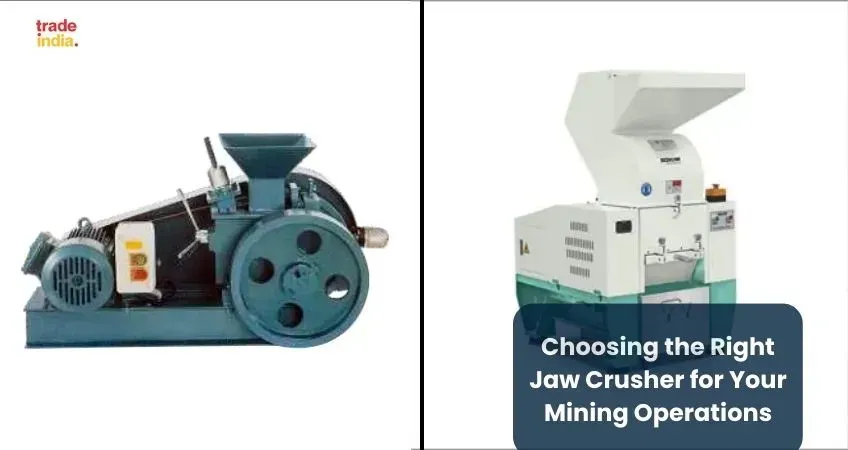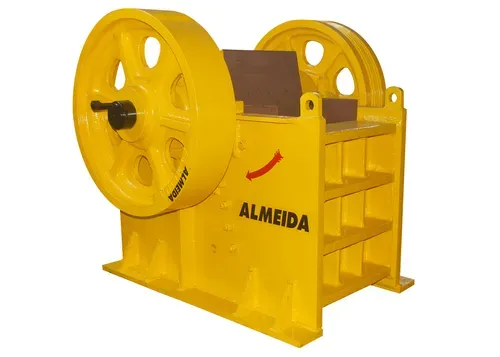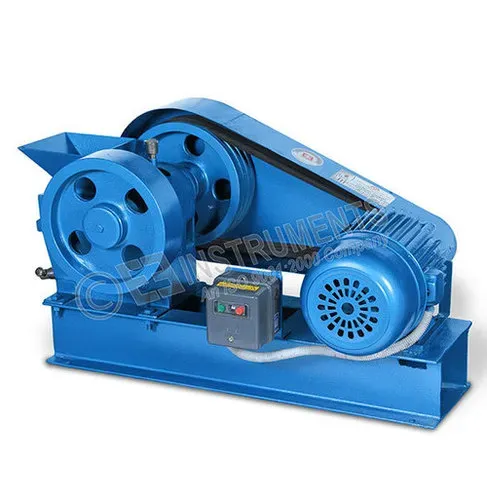Choosing the Right Jaw Crusher for Your Mining Operations

Mining is a critical job requiring skilled engineers, trained professionals, and the most advanced technology there is. Workers rely on efficient and high-performance equipment like Jaw Crusher, which is available in the market in different variants and customizations. Choosing the right jaw crusher for your business becomes essential for getting optimal performance, efficient use of resources, and avoiding financial loss. This blog shares in-depth knowledge about jaw crushers and how to choose the right one for your business. This powerful equipment comes in varying capacities, sizes, and designs ensuring it caters to specific requirements of the industry. Selecting the right one for your business will involve analyzing various factors. Let’s discuss this in detail.
Factors to Consider While Choosing The Right Jaw Crusher for Your Business
Feed Size
Estimating the feed size is one of the essential factors to consider when choosing a jaw crusher. You can measure the largest material size to throw in a crusher, as this equipment has the upper limit on the size of material it can accommodate.
Capacity
Determine your required production volume. Crushers are rated by tons per hour or metric tons per hour. Match the crusher’s capacity with your production targets to avoid bottlenecks.
Material Type
Hardness and Abrasiveness: Assess the hardness and abrasiveness of your material. Harder materials can cause increased wear on the crusher and might require more robust models.
Moisture Content: High moisture content can lead to clogging and operational issues. Choose a crusher designed to handle wet or sticky materials if necessary.
Crushing Ratio
Primary vs. Secondary Crushing: Understand the difference between primary and secondary crushing ratios. Ensure the jaw crusher you select is appropriate for its intended stage in the crushing process.
Desired Output Size: Determine the final size of the product you need. Jaw crushers can produce different sizes of output depending on the discharge opening setting.
Power Requirements
Motor Size: Check the motor’s power rating, as it should be sufficient to handle the crushing load. Underpowered motors can lead to reduced performance and potential damage.
Energy Efficiency: Evaluate the energy consumption of the crusher. Efficient crushers can help lower operational costs over time.
Durability and Maintenance
Construction Material: Look for hydraulic jaw crushers made with high-quality steel and durable components. Hard-wearing materials can extend the lifespan of the equipment.
Ease of Maintenance: Choose a model with easy access to parts that require regular maintenance, such as bearings and jaw plates. Regular maintenance schedules and availability of replacement parts are crucial for minimizing downtime.
Cost
Initial Investment: Consider the upfront cost of purchasing the crusher. Higher initial costs might be justified by increased durability or efficiency.
Total Cost of Ownership: Factor in maintenance costs, operating expenses, and potential repair costs. Analyze the cost-benefit ratio over the expected lifespan of the equipment.
Ease of Use
Control Systems: Look for crushers with modern control systems that provide ease of operation, such as touch-screen interfaces or automated settings.
Training Requirements: Assess the learning curve for your operators. More user-friendly equipment can reduce training time and errors.
Size and Dimensions=
Footprint: Measure the physical dimensions of the crusher to ensure it fits within your facility’s space constraints. Consider how it will integrate with other equipment.
Transport and Installation: Plan for the logistics of transporting and installing the crusher. Ensure that access to the installation site is adequate.
Manufacturer and Support
Reputation: Research the manufacturer’s reputation for quality and reliability. Look for testimonials, case studies, or industry awards.
After-Sales Support: Evaluate the support services provided, including the availability of technical support, training, and service contracts. Reliable after-sales support can significantly impact operational efficiency.
Regulatory Compliance
Safety Standards: Ensure the crusher complies with local and international safety regulations. Features like emergency stops and safety guards are important for operator safety.
Environmental Regulations: Verify that the equipment meets environmental standards, such as noise and dust control regulations. Compliance helps avoid legal issues and contributes to sustainable operations.
Common Types of Jaw Crushers
Single-Toggle Jaw Crusher
Features a single toggle mechanism that generates an elliptical motion for compressive crushing. Known for its simplicity, it’s ideal for primary crushing of softer materials. Its design ensures fewer parts and lower maintenance costs.
Double-Toggle Jaw Crusher
Double roll crusher utilizes two toggle plates and a more complex mechanism, allowing for higher crushing efficiency and durability. This type is better suited for hard and abrasive materials, offering improved throughput and reliability.
Blake Jaw Crusher
A single-toggle type named after its inventor, Eli Whitney Blake. It provides a higher reduction ratio and is effective for primary crushing, especially in mining and aggregate production.
Dodge Jaw Crusher
Another single-toggle design where the swing jaw moves horizontally. The pivot point is near the discharge end, which allows for a more uniform product size and better handling of harder materials.
Universal Jaw Crusher
Combines features of both single and double-toggle crushers, offering versatility for both primary and secondary crushing tasks. It can handle a range of material sizes and types.
Mobile Jaw Crusher
Mounted on a portable chassis, this type allows for mobility and easy relocation. It’s ideal for projects where the material source varies or space is limited.
Mini Jaw Crusher
A smaller version designed for laboratory or small-scale operations, providing efficient crushing in a compact form.
Advantages of Jaw Crusher in the Mining Industry
High Reduction Ratio
Jaw crushers are effective at reducing large rocks into smaller, manageable sizes. They typically have a high reduction ratio, which helps in breaking down materials to the required size for further processing.
Versatility
They can handle a variety of materials, including hard and abrasive rocks, making them versatile for different mining applications.
Durability
Built with strong materials like steel and high-quality components, jaw crushers are designed to withstand the harsh conditions of mining operations. Their rugged construction ensures long-lasting performance.
Reliability
Jaw crushers are known for their reliability and consistent performance, which is crucial for maintaining continuous mining operations.
Ease of Use
Jaw crushers have a straightforward design, which makes them relatively easy to operate. The basic controls and mechanisms are user-friendly, reducing the need for extensive training.
Low Maintenance Requirements
Blow bar crushers require minimal maintenance compared to other types of crushers. Routine checks and occasional replacement of worn parts, such as jaw plates, are generally sufficient to keep them running smoothly.
Lower Initial Investment
Jaw crushers generally have a lower initial purchase cost compared to other types of crushers, such as cone or impact crushers. This makes them an attractive option for budget-conscious operations.
Long-Term Savings
Their durability and lower maintenance costs contribute to long-term savings, making them a cost-effective choice for primary crushing.
Large Feed Capacity
Jaw crushers can accommodate large feed sizes, which allows for high throughput and efficient processing of bulk material. This is particularly beneficial for operations handling large volumes of ore.
Adjustable Output Size
The output size of a jaw crusher can be easily adjusted by changing the setting of the discharge opening. This flexibility allows for precise control over the size of the final product.
Efficient Power Usage
Modern jaw crushers are designed to be energy-efficient, minimizing power consumption while delivering effective crushing performance. This can reduce operational costs and improve overall efficiency.
Controlled Dust Generation
Many portable jaw crushers are equipped with dust control systems or can be fitted with additional dust suppression equipment, helping to reduce dust emissions and maintain a cleaner work environment.
Safety Features
Jaw crushers often come with built-in safety features, such as emergency stop buttons and safety guards, to protect operators and reduce the risk of accidents.
Adaptability
Jaw crushers can be scaled up or down to meet the specific needs of the mining operation. This adaptability makes them suitable for both small-scale and large-scale mining projects.
EXPLORE MORE:


